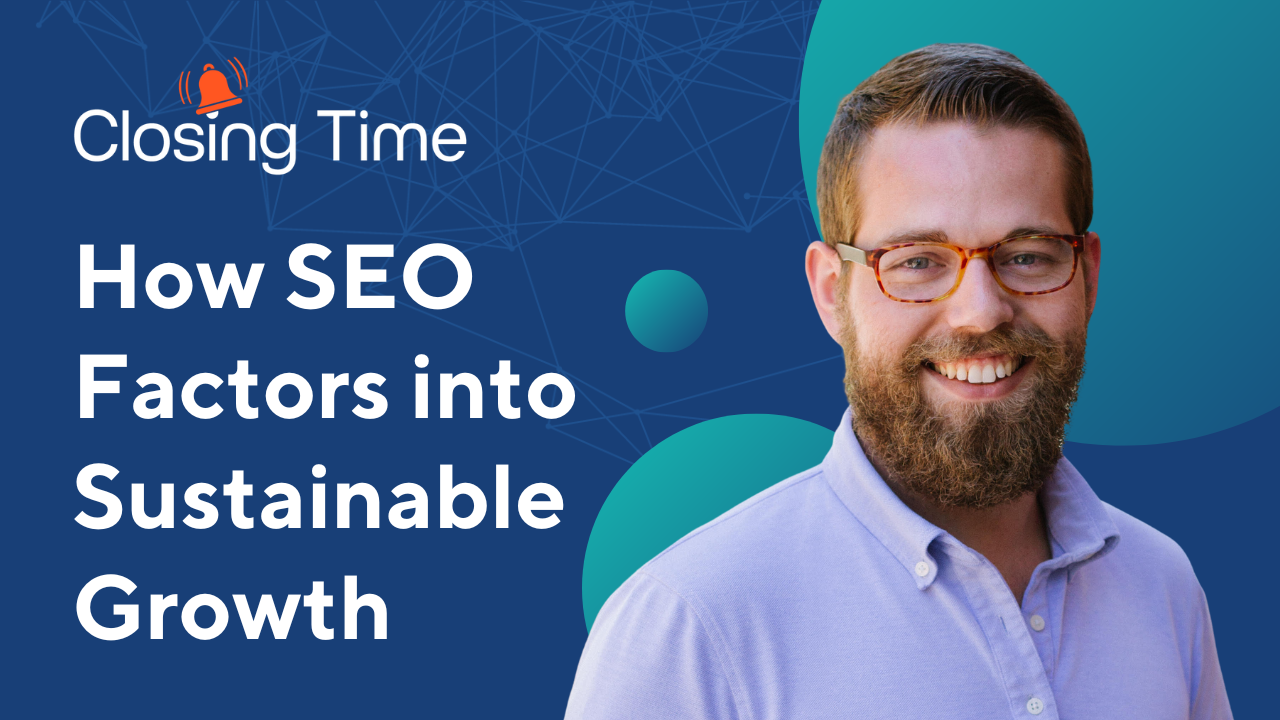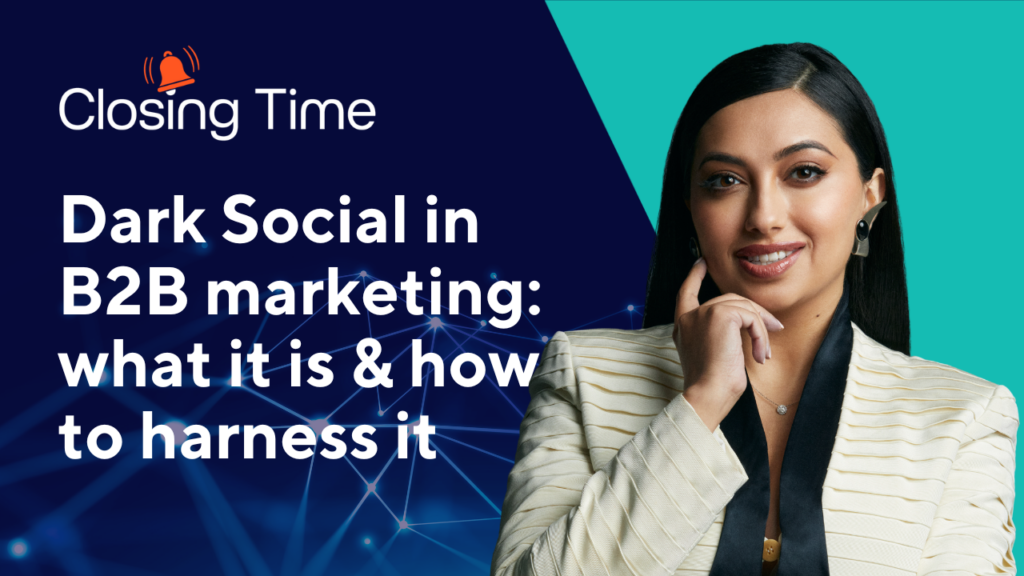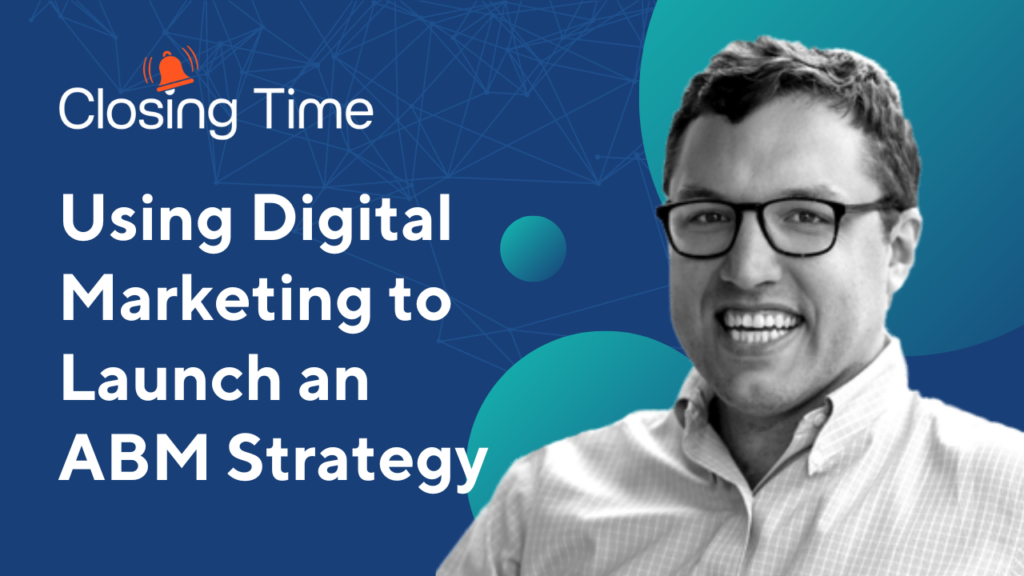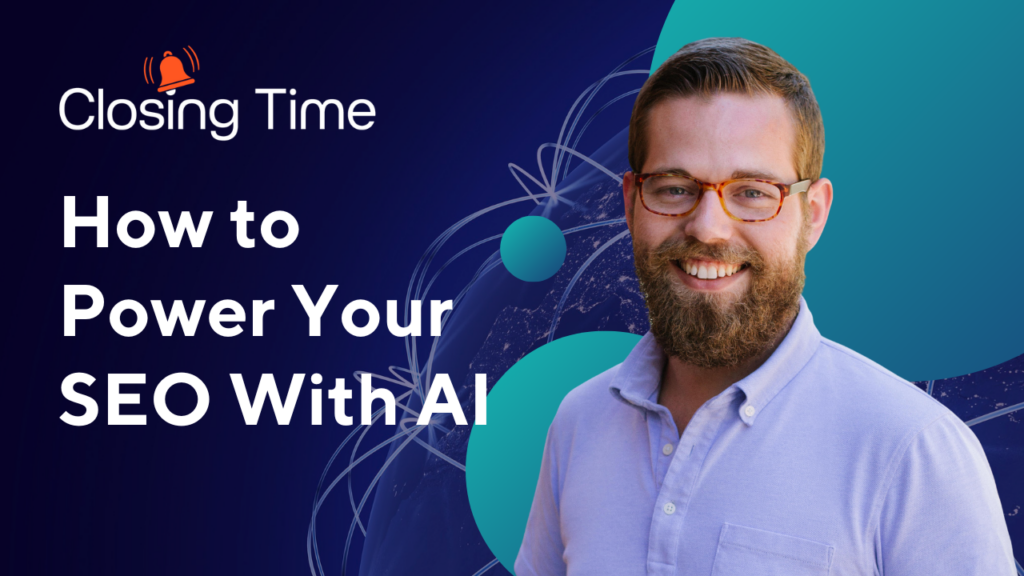The era of growth at all costs is likely over forever. Does this mean it’s SEO’s time to shine? Let’s talk about it on this episode of Closing Time. Thanks for tuning into Closing Time the show for Go to Market Leaders. I’m Val Riley, head of content and digital marketing at Insightly. Today I’m joined by Mitch Causey. He is CEO of Demandwell, an SEO growth platform. Welcome to the show, Mitch.. Thanks so much, Val. Thanks for having me. Awesome. Let’s just jump right in because the knock on SEO has always been that it takes too long. But one could argue that that work is, it’s just unavoidable. Yeah, absolutely. You know, if there’s one thing, being someone who runs a company that helps folks with SEO, if there is one thing. I could change about it, it would be that it actually works faster than it does. But one of my favorite quotes is the one I can’t remember who said it, but the opportunity is often missed because it’s dressed up in overalls and looks like hard work. And it is. But those who, you know, find that opportunity and stick with SEO can often have an incredible and compounding effect on sourcing revenue, which I’m sure we’ll get to here in a bit. Right. Yeah. So we talked a little bit in another episode about kind of shortening that time frame by using AI tools as a helper. Yeah. But the strategy behind all that content still has to be there. Yeah. Yeah, exactly. Exactly. And the AI impact on decreasing the amount of time to see a, you know, fantastic result is really impactful, you know, just to compare, just a few years ago I was running a team and we had three writers, three full time writers on staff. We had a decent sized budget and it took us a couple of years to create over 600 pieces of content in today’s world with, you know, tools like Demandwell, you can do that same in just a matter of months with far less budget and with just a few hours a week rather than three full time people all the time. So, absolutely, you know, AI is really powerful, part of decreasing the time that it takes to be successful with SEO. So let’s talk a little bit about the mix between paid and organic, because I’ve worked at a lot of high growth companies and anyone who works in a high growth company will tell you that that paid search line item is such a killer, it just kills your budget. But we think about organic is the long haul, and paid search is kind of the quick fix. But you had an interesting take on this where you stated that really to do paid well, it still takes a quite a bit of time. Yeah. Yeah, absolutely. I mean, you know,. I don’t have all experience, but in my experience. I have definitely noticed that, you know, there’s a lot of wasted ad spend going on out there. And in order to make an ad program incredibly efficient, it takes a lot of time. And I’ve seen that in various folks that I’ve managed through the years who are running paid ads for high growth companies.. There is definitely a difference between who is running it, not just how much you’re spending, for sure. Yeah, it can be hard, too, because you have those you know, those graphs that you see and the CEO or your CRO might say, well, you know, the traffic is going up and you realize that it’s paid that’s driving it, not necessarily organic, but it’s a nice curve to have. So I think striking that balance is what’s really important. Exactly. And I am a huge proponent of paid search by the way too, and paid advertising in general. Sometimes that shocks people, you know,. I very much believe in a complete and healthy marketing mix. Exactly like you said, it’s finding that balance is most important. Yeah. And again, that growth at all costs mentality where we’re just going to keep spending and spending and spending, I think, you know that has diminishing returns after a while. So it really points back to having a strong organic strategy in place. Yeah, Yeah, absolutely. And I do think a positive coming out of all of this is that it’s going to make people spend their advertising budget more responsibly, too. You know, I think sometimes in the last year or two, people have just turned on ads and said, hey, it’s working, at least to some degree. Let’s just keep doing it and do more of that and not thinking, well, how do we actually optimize that to get even more out of what we’re already spending to? Yeah. So I think it’s interesting because both of our organizations, Mitch, have podcasts and it speaks to like the meta aspects of this conversation because we’re literally creating content and having a conversation about creating content. Yes.. To boost organic strategy. Yes, exactly. So yeah, so podcasts, you know, are absolutely a fantastic part of an overall organic strategy. A huge part of that.. Just a couple of quick tips. Huge part of that is definitely making sure that you’re getting a solid transcription. Don’t rely just on the robot. Make sure you are reading those transcripts. And then the other thing too is understanding what keywords would be on, you know, what keywords that people are searching for should be on the page but didn’t come up in the conversation. It is okay to add content in commentary about a transcript. That is totally okay to do. And you know, like kind of the have the page, in this example of the video and at the top you got the transcript below and then you can add commentary as well to integrate some more of those keywords that just didn’t come up in the natural conversation. So speaking of, you know, emphasizing that organic strategy, sometimes if there’s this perception, well, hey, that’s marketing’s job. But really, do you have any ideas for getting the full go to market team involved in supporting the SEO strategy? Like sales, of course, marketing, product, the customer support, how can we make them all feel like the SEO strategy is our combined responsibility? Yeah, absolutely. One way that is often overlooked and it just breaks my heart that it’s so overlooked is the insights that you can gain from keyword research. Research in particular is literally what has kept me kind of in the SEO world for as long as I’ve been in it, because it is a direct representation of what an audience is searching for in their most vulnerable moments. It is them and a computer and that’s it. They’re not trying to impress anybody. They are trying to find an answer to their problem. And so there’s no other market research database that gets eight point, I think the most recent stat was like eight and a half billion searches, so eight half billion data points every single day. There’s no market research project that can compete with that. And so what often gets overlooked is the SEO person or even the paid search person, they’re doing keyword research to keep those insights to themselves. Not not out of any kind of mal intent, but just because other people don’t feel like they need to see that data. I think sharing that data across the organization is so important. It helps your product team understand the problems that people are prioritizing based on, you know, search volume. It helps your sales team understand the mind of the user better and understand again what problems that they are looking for. All across the org, it can absolutely help. So I think insights is one, and that’s kind of the marketing team providing value for the rest of the org. And then the other way is actually to get value from the rest of the org. So leveraging salespeople, leveraging product managers, leveraging CS team, really everyone across the org, the executive team, to create content because like we’ve talked about, especially in our AI episode, there is no one in the world and there is no AI that can know your business as well as you do. And so if you leverage other folks in your organization to create content, that content is going to be perfectly matched to what you guys are trying to do as a business and then as the marketing team, you can take that and maybe massage it a little bit to make sure that it has the SEO value that it needs. But overall, I think those are two very clear ways that often get overlooked. But one is, you know, passing insights from marketing to the rest of the org, and the other one is leveraging the rest of the org to create content that is better and effectively cheaper than most other options as well. It’s funny that you mention that because I often feel when I see the keyword research, it’s almost feels like it’s cheating for me to know the answers. Yeah, because it’s amazing. It’s the exact insight. It’s this is what people are looking for when they find us. It does put the onus on marketing. However, like you said, to be sharing that data with the rest of the teams and involving them in what is happening in search to increase their understanding. And then maybe like you’re saying, maybe that would encourage them to increase their participation. Exactly. Exactly. So, you know, when we talk about paid growth and organic growth, I mean, obviously it’s we want to find low CAC or customer acquisition costs and high ROI, like that’s the golden ticket. But one thing that you said I found very interesting was that experimentation has to be part of your journey because even if you think you isolate, hey, here’s the one channel that is giving us low. CAC and high ROI, it’s not necessarily going to stay that way for any sustained period of time. Yeah, absolutely. Absolutely. And there’s so much we could talk about around this. There’s actually, this morning I was thinking of a similar concept and I’ll share my experience when I was at a company called Lessonly. They were recently acquired, but they were in the online training software space. One day I took 8 hours to create a page called on online training software. It’s just this kind of a category page of that world. I took 8 hours, it was my whole day. That’s all I did that day. And I think it’s a perfect example of the compounding effect that SEO can have, because I spent 8 hours once that day. It was a terrible investment, that month it was probably a terrible investment. But through the years and over time, that page, I was there for five years and I did that very early on. So within five years, that single page that I spent 8 hours doing once ended up driving over $1,000,000 in revenue for that business. So if you were to say, if you were to tell anybody, hey, spend 8 hours and you get a million bucks, they would say, yes, let’s do it right. And so, you know, keeping that long term mindset in mind, I did that once for that, but then I did that hundreds of other times. But that took time. And so over time, those added up and added up and added up and added up. And I think one thing that’s really important about all that is like, year five was the best year, but it wasn’t the only year that it drove business. It builds over time and tying it back to this because we were pretty darn confident in that growth rate and that consistency that was just always there. We always had that to fall back on. We were able to experiment with paid strategies more than we would have been able to otherwise. We were also able to experiment with all sorts of zany ideas like direct mail campaigns, you know, just silly stuff. We made board games, we made stuffed animals of our mascot. All these things that we didn’t know which one was going to actually take off. But we didn’t have to have every single one take off because we knew SEO is going to have our backs, at least to some degree. And I think that’s the big part about compounding, growth of sourcing revenue from organic search is that it creates a backdrop that you can fall back to. And if you don’t have that, your backdrop is zero. If you try a zany campaign and it fails, nothing happened that month. And so so if you keep that in mind, you can definitely experiment in a lot more ways and even a lot more fun ways because you’re kind of doing that, that boring and hard work taxing element kind of behind the scenes. Gosh it’s what every marketing team wants, right? The freedom to experiment and try new things. But still, knowing that you have solid strategies in place that are going to continue your growth. Exactly. Awesome. Mitch, this was a great conversation. I got so many insights and things. I’m going to put to use right away. I hope everybody else got a few good takeaways. Awesome. Well thank you so much for having me, Val. Appreciate it so much. To all of you tuning in, please remember to like this video. Hit the button for notifications and subscribe to the channel so you don’t miss another episode. We’ll see you next time on Closing Time.






